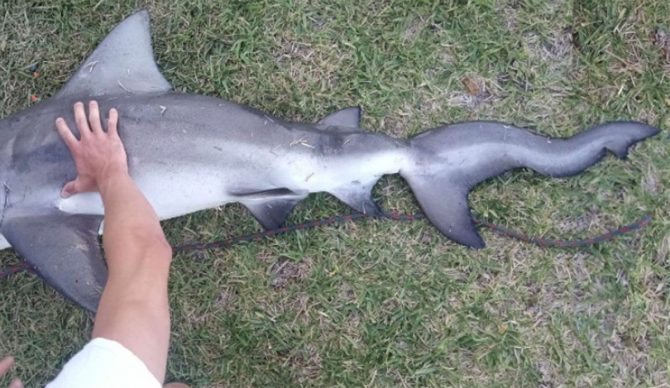
The juvenile bull shark likely had a form of scoliosis or a spinal deformation. Photo: Tittle//FWRI//Facebook
A Florida fisherman reeled in something unexpected on June 3: a “squiggly” bull shark.
Brian Tittle and his son were fishing together in Titusville, Florida when Brian hooked something strong. “It took us an hour to reel it in,” Tittle told FOX 35. “As soon as I seen its tail, I knew something was wrong.”
When they got the young bull shark onboard, it was clear that this wasn’t an average shark. Its tail was, as The Fish and Wildlife Research Institute (FWRI) called it, “squiggly.” At first, Tittle thought maybe the shark had broken its tail or was the victim of a boat propellor strike, but when Tittle sent the photos he took in to wildlife officials, they told him it was “a form of scoliosis or spinal deformity affecting the vertebral column.”
Bull sharks are often regarded as one of the most dangerous sharks in the world. They are an aggressive species that hunts in warmer, shallower waters — which is also where humans like to hang out. Humans, though, are not really on the menu, and it’s thought that most attacks involving bull sharks are accidental test bites. They grow up to about 12 feet long and can weigh up to 500 pounds.
Although it isn’t super likely for shark to have scoliosis, it isn’t unheard of. The FWRI team has seen it before, and not just in sharks. “While the condition is rare,” they wrote, “our team has encountered similar anomalies in other shark and bony fish species.”
After reeling it in and taking a few photos of it, Tittle decided to release it, relatively unharmed save for the hook and the embarrassment of ending up on a fisherman’s boat.
“I figured it had a tough life already,” Tittle said. “I feel bad keeping this one.”

